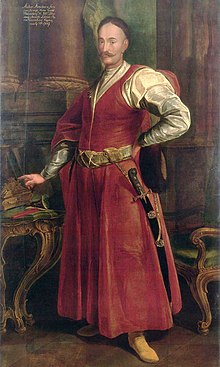Stanisław Antoni Szczuka
| Stanisław Antoni Szczuka | |
|---|---|

Imaginary portrait of Stanisław Antoni Szczuka, about 1735-40, unknown painter, Wilanów Palace collection
|
|
| Coat of arms | Grabie |
| Spouse(s) | h. Piława |
|
Issue
August Michal Szczuka
Marcin Leopold Stefan Szczuka Jan Konsty Szczuka Wiktoria Szczuka Maria Anna Szczuka |
|
| Noble family | Szczuka |
| Father | Stanisław Szczuka h. Grabie |
| Mother | Zofia Szpilewska Neronowiczów |
| Born | 1652 or 1654 Lubonicze (probably) |
| Died | May 19, 1710 (aged 56–57) Warsaw, Poland |
Stanisław Antoni Szczuka h. Grabie [ˈʂt͡ʂuka] (1652 or 1654 – May 19, 1710) was a Polish noble (szlachcic), talented politician and political writer.
Son of a serviceman Stanisław Szczuka h. Grabie and Zofia Szpilewska z Neronowiczów. He married h. Piława on February 6, 1695, the daughter of starost of Janów Bogusław Potocki h. Piława.
He was a Recorder of the Crown in 1688, deputy of Polish–Lithuanian Commonwealth in Ducal Prussia in 1690, Deputy Chancellor of Lithuania from 1699.
Szczuka was born to a middle-class szlachta family and educated in Wilno and Kraków. Because of his own ability and hard work he achieved high offices in the Republic. He began his political and career as secretary of King Jan III Sobieski. In 1696 he became an adviser to August II.
In 1706 he changed sides and became a supporter of Stanisław Leszczyński.
He was a notable political writer and Sejm orator. He also proposed the opening of public schools free of charge.
As Sejm Marshal he led the extraordinary Sejm on November 17, 1688 – April 1, 1689 and the pacification Sejm on June 16–30, 1699 in Warsaw.
He died on May 19, 1710 in Warsaw and was buried in Szczuczyn.
...
Wikipedia

